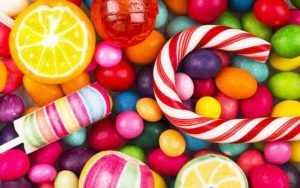What do these substances do to our health? And our gut microbiome (microbial community)? Pay attention to the ingredient list on food labels. And consider buying more organic foods (which ban routine use of antibiotics and hormones,etc.). From Medical Daily:
Foods To Avoid? 10 Things In Americans' Favorite Foods That Are Banned In Other Countries
In a country so consumed with counting calories, the gluten-free fad, and fast food, the ingredients section on the back of packages are widely overlooked and riddled with internationally banned foods... Americans Still Eat These 10 Foods & Ingredients Banned Around The World:
1. Farm-Raised Salmon Banned in Australia, New Zealand, and Russia...Farmed salmon don’t have a lot of room to swim, don’t follow their natural migration patterns, and have an unnatural diet of grains, which is why they’re fattier than wild salmon and contain 50 percent less omega-3 fats and protein. They’re grown with a mix of antibiotics, vitamins, drugs, and chemicals and don’t have wild salmon’s natural color, so they’re fed a synthetic astaxanthin to achieve the pinkish-red shade.
2. Ractopamine-Tainted Meat Banned in Russia, Mainland China, Taiwan, and 160 countries across Europe.... Ractopamine, also known as Paylean and Optaflexx, is a drug fed to livestock to reduce the fat content and enhance muscle, making the meat more profitable per animal. It was originally used to treat asthma and is found in 45 percent of pigs, 30 percent of ration-fed cattle, and an unknown percentage of turkeys.
3. Genetically-Engineered Papaya Banned in the European Union... 4. Flame Retardant in Drinks Banned in Japan and 18 European countries. In 1977, the FDA itself approved brominated vegetable oil (BVO), a patented flame retardant used in sodas and sports drinks in the U.S. Recently Coca-Cola and PepsiCo announced they’re working on removing the controversial BVO from their drinks as a result of petitions.
5. Processed Foods with Artificial Food Colors and Dyes Banned Norway and Austria. If it’s not banned in a country outside of the U.S., it requires a warning label. Red 40, yellow 5, yellow 6, and blue 2 weave their way into the American ingredients list of a wide variety of foods. They’re the most commonly used dyes in the U.S., found in mac-and-cheese, cheddar flavored crackers, Jell-O, and children’s cereals.
6. Arsenic-Laced Chicken Banned in the European Union.. Since the 1940s, farmers have been feeding livestock arsenic to fight off disease; however, they now use it to make animals grow quicker and make the meat appear pinker and fresher....7. Bread with Potassium Bromate Banned in the European Union, Canada, and China... 8. Olestra/Olean Banned in the United Kingdom and Canada. Procter & Gamble created this cholesterol-free fat substitute for their fat-free snacks.... 9. Preservatives BHA and BHT Banned in Japan and the European Union. It’s found in anything from meat, to butter, beer, and breakfast cereals.
10. Milk and Dairy Products Laced with rBGH Banned in Australia, New Zealand, Israel, Canada, and the European Union. In order to increase a cow’s milk production, scientists invented a rBGH, a synthetic version that mimics a natural hormone produced in their pituitary glands, known as bovine somatotropin. When rBGH came onto the market, the United Nations Safety Agency ruled unanimously not to endorse it in 1999, and eventually U.S. milk was internationally banned from being imported into their countries. In the U.S., approximately one in six dairy cows are injected with growth hormones on a regular basis, causing pus and antibiotic contamination and 16 other adverse health effects.
 Finally... two states (California and New York) are seeking to ban 5 chemicals frequently added to food that are known to cause health problems (cancer, neurological problems, hormone disruptors). They have no reason to be in food (and yes, safer alternatives exist). The five chemicals of concern are: red dye 3, titanium dioxide, potassium bromate, bromated vegetable oil, and propylparaben.
Finally... two states (California and New York) are seeking to ban 5 chemicals frequently added to food that are known to cause health problems (cancer, neurological problems, hormone disruptors). They have no reason to be in food (and yes, safer alternatives exist). The five chemicals of concern are: red dye 3, titanium dioxide, potassium bromate, bromated vegetable oil, and propylparaben.